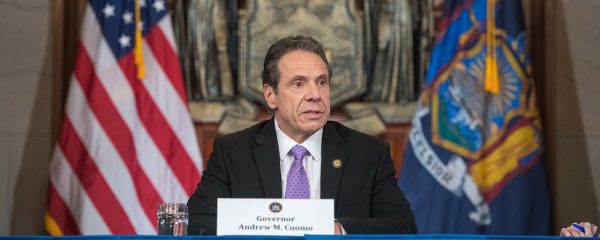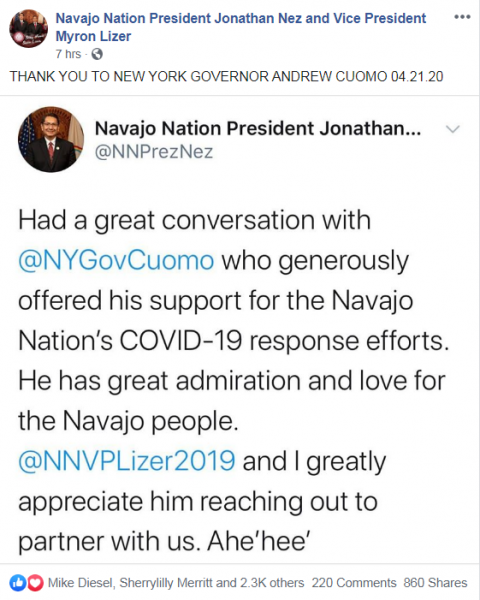
- Details
- By Native News Online Staff
WINDOW ROCK, Ariz. — Navajo Nation President Jonathan Nez may be under quarantine at home because he came in contact with someone who was COVID-19 positive, but he sure is in touch with outside the Navajo Indian Reservation. On Tuesday, Nez received a telephone call from New York Gov. Andrew Cuomo, who called to offer support to the Navajo Nation’s response to the COVID-19 pandemic.
The two leaders have something in common. They are overseeing the COVID-19 pandemic in two of the hottest coronavirus spots in the United States.
New York has the most confirmed cases of the deadly virus in the country. Though not a state, the Navajo Nation, which is located on the country’s largest Indian reservation, ranks number three behind New York and New Jersey in per capita cases of confirmed coronavirus.
Cuomo, who has gained a lot of national attention during the pandemic because of his daily briefings, has spoken brazenly about how New Yorkers help others in need and that he would assist other states. Late last week, he offered ventilators to other states, such as Michigan. One hundred ventilators arrived from New York in Lansing, Michigan on Monday.
On Tuesday, he offered President Nez assistance to the Navajo Nation. 
Late Tuesday afternoon, Nez sent out message on social media:
“Had a great conversation with @NYGovCuomo who generously offered his support for the Navajo Nation’s COVID-19 response efforts. He has great admiration and love for the Navajo people.
@NNVPLizer2019 and I greatly appreciate him reaching out to partner with us. Ahe’hee’”
Cuomo is no stranger to Indian Country. While serving as the Secretary of Housing and Urban Development, in July 1999, he joined then President Bill Clinton on a visit to the Pine Ridge Indian Reservation in South Dakota, the country’s second largest reservation. As the result of the visit where they visited a five bedroom house on the reservation that was home to 28 people, Cuomo helped to establish the HUD-Section 184 mortgage loan program.
More Stories Like This
Native News Weekly (August 25, 2024): D.C. BriefsNavajo Nation Mourns the Passing of Former Vice President Rex Lee Jim
Deb Haaland Earns Endorsement From Communications Workers of America Local 7076
University Soccer Standout Leads by Example
Two Native Americans Named to Democratic Congressional Campaign Committee's“Red to Blue” Program
Help us defend tribal sovereignty.
At Native News Online, our mission is rooted in telling the stories that strengthen sovereignty and uplift Indigenous voices — not just at year’s end, but every single day.
Because of your generosity last year, we were able to keep our reporters on the ground in tribal communities, at national gatherings and in the halls of Congress — covering the issues that matter most to Indian Country: sovereignty, culture, education, health and economic opportunity.
That support sustained us through a tough year in 2025. Now, as we look to the year ahead, we need your help right now to ensure warrior journalism remains strong — reporting that defends tribal sovereignty, amplifies Native truth, and holds power accountable.
 The stakes couldn't be higher. Your support keeps Native voices heard, Native stories told and Native sovereignty defended.
The stakes couldn't be higher. Your support keeps Native voices heard, Native stories told and Native sovereignty defended.
Stand with Warrior Journalism today.
Levi Rickert (Potawatomi), Editor & Publisher

